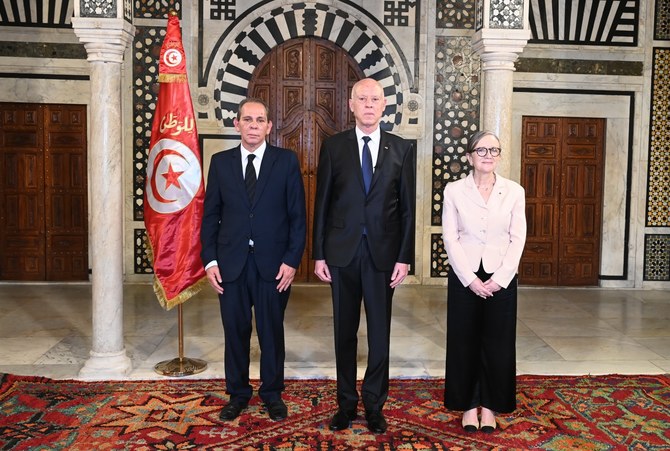Talmiz Ahmad
On Aug. 1, Tunisian President Kais Saied dismissed Prime Minister Najla Bouden and appointed Ahmed Hachani, a human resources director in the country’s central bank, in her place. The new prime minister is charged with immediately addressing Tunisia’s serious economic situation, even as the country remains engulfed in a political impasse, largely created by the president himself.
Tunisia has been experiencing economic problems since 2011 when popular uprisings toppled the longstanding president Zine el-Abidine ben Ali and took the country on a democratic path. However, while Tunisia acquired a democratic constitution, the country’s politicians remained neither capable of, nor interested in, enacting the sweeping economic reforms so desperately needed. The 2011-19 period is recalled as the lost decade of growth, when gross domestic product declined to 1.7 percent on average. In the absence of economic reforms, the country had sluggish economic activity, low investment, reduced trade and slow job creation. In October 2019, the people voted Saied in as president. Although their new leader was an academic with no political experience, the people responded enthusiastically to his promise to end corruption and reform the economy.
But Saied’s two years in power saw no change; the economy remained in an abysmal state. Saied blamed the country’s politicians and concluded that the national political order needed to be uprooted. In July 2021, he effected a constitutional coup by suspending the national assembly and constitution, and assumed all legislative and executive authority. A year later, a new constitution was approved, effectively doing away with Tunisia’s brief encounter with the democratic process. But while the president exercises unquestioned authority, he has not been able to bring about the far-reaching changes required. Observers have pointed out that the business system remains inefficient, posing severe difficulties for investment and trade, with the state retaining the principal role in the economy.
The Ukraine war has wreaked havoc on the already-vulnerable economy. Tunisia imports over 60 percent of its wheat and barley from Russia and Ukraine. As grain prices shot up in the wake of the conflict, the country began to experience shortages of flour and other food items, such as rice, sugar, semolina, cooking oil, coffee, milk, medicines and fuel. In February 2023, the inflation rate increased for the 18th consecutive month to 10.4 percent, the highest since December 1984. Tunisia also experienced sharp increases in the price of gas imported from Algeria. The country’s 2022 budget suffered losses of $1.3 billion on account of the Ukraine war. Economic recovery has been slow: GDP grew by 2.5 percent in 2022, with the services sector seeing a 4 percent growth, largely due to a pick-up in tourism and transport. But unemployment remains high at about 15 percent, the same as in 2019, though joblessness among women is much higher at over 20 percent. The informal sector has 45 percent of the country’s total employment – 1.6 million out of a total workforce of 3.6 million. The youth make up 23 percent of the workforce, but constitute 32 percent of the informal sector.
In October 2022, Tunisia negotiated a four-year agreement with the International Monetary Fund for $1.9 billion to support economic reforms. The IMF conditions included gradual elimination of subsidies, fair taxation, improved governance and transparency in the public sector, and wide-ranging structural reforms. However, the agreement was left in limbo in April 2023 when the president rejected foreign “diktat” on national economic policies. Saied fears that the conditions proposed by the IMF would encourage street protests of the kind that had brought down Zine El-Abidine Ben Ali’s government in 2011. He asserts, instead, that the economic malaise is due to corruption, thus justifying a further crackdown on opposition figures. He has also blamed the presence of migrants from sub-Saharan Africa, with his sharp words leading to attacks on asylum-seekers and even black Tunisians.
Tunisia’s political and economic situation has reverberated in both the US and EU. In 2022, in response to the country ending its democratic order, the US suspended a multibillion-dollar loan from the IMF and a $500 million infrastructure grant from the Millennium Challenge Corporation foreign aid agency. However, Washington’s official position has remained ambivalent, responding to the end of the democratic order with only relatively mild diplomatic criticisms. The US values Tunisia as its strategic partner in North Africa, despite the authoritarian system in place today. In July, the World Bank announced it would provide about $270 million for a green energy project in Tunisia. Restoration of further US financial support in the near future cannot be ruled out.
In June, Tunisia hosted an EU delegation that included the Italian and Dutch prime ministers, as well as European Commission President Ursula von der Leyen. Later, on July 16, Tunisia and the EU signed a “strategic partnership” agreement, with Brussels agreeing to provide one €1 billion euros ($1.1 billion) to promote Tunisia’s economic recovery and upgrade facilities to control the movement of illegal migration. This year alone about 400,000 migrants are expected to enter Italy. Saudi Arabia has also announced a soft loan of $400 million and a grant of $100 million for Tunisia. However, even with a new prime minister, these palliatives are unlikely to bring about the changes the country needs. Having no plans to pursue economic reforms, Saied has chosen the more perilous authoritarian path. The outlook for Tunisia is dismal.







